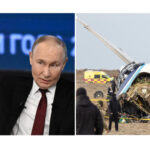Syria’s Defence Minister, Murhaf Abu Qasra, announced that Russia could be permitted to maintain its military bases along Syria’s Mediterranean coast, provided it aligns with the country’s national interests.
In the wake of the Bashar al-Assad regime’s ouster, the transitional government is redefining its international alliances. According to Abu Qasra, Moscow’s stance has “improved significantly,” signaling a potential shift in relations.
Russia, which once offered refuge to Assad and supported him militarily against rebel forces, is negotiating with Syria’s interim administration to keep its two bases: the naval facility in Tartous and the Hmeimim air base near Latakia. Russian President Vladimir Putin had deployed troops to Syria in 2015, aiding Assad in recapturing extensive territories but also contributing to large-scale devastation in opposition-held regions.
Under the country’s new leadership, Syria is weighing Moscow’s request to retain both strategic sites. When asked about the policy reversal, Abu Qasra noted that “in politics, there are no permanent enemies,” adding that Moscow might continue using these installations “if we get benefits for Syria out of this.”
Russian Deputy Foreign Minister Mikhail Bogdanov confirmed ongoing talks about the country’s military presence, stating, “So far, nothing has changed,” leaving the ultimate fate of Russia’s bases unresolved.
Negotiations with the US and Turkey
Syria is simultaneously holding discussions with the United States and Turkey regarding their respective military roles. American troops have been operating in northeastern Syria since 2015 to combat the so-called Islamic State (IS), working alongside the Kurdish-led Syrian Democratic Forces (SDF).
“The issue of whether the United States will continue its presence in Syria’s northeast is under negotiation,” Abu Qasra remarked.
Meanwhile, Turkish Foreign Minister Hakan Fidan recently suggested a regional coalition—comprising Syria, Iraq, Jordan, and Turkey—to counter lingering IS threats, potentially reducing the American footprint. While Syria’s new leadership appears open to the proposal, Abu Qasra did not provide further details.
The situation in Kurdish-controlled regions, which constitute roughly a quarter of Syria’s territory, remains a major concern for the transitional government. Abu Qasra stressed that Damascus aims to maintain full sovereignty, yet prefers a peaceful resolution to avoid “bloodshed on both sides,” noting, “We are not inclined toward a military solution.”







